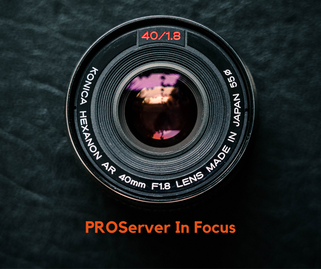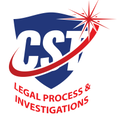|
Author: The Process Server Center | PROServerCENTER is a legal professional organization whose mission is to set a national standard for the process service industry in the United States.
Highlights:
Stephen Webster is a certified process server and member of PROServer LIST from the state of Colorado. He runs CST Servers, conveniently located in Wiley, CO. In addition to service of process, Stephen provides private investigative services, security and consulting. CST Servers is a veteran owned company that proudly serves law firms of all sizes in the Southeast Colorado area. Stephen Webster is well versed in the laws and regulations that govern the process service industry to ensure acceptable service by the courts. Under his direction, CST Servers handles a wide variety of legal documents, including subpoenas, writs, summons and complaints and provide efficient and accurate process service every time. 
Stephen Webster's background in law enforcement and security helps him with locating hard to find individuals and ensuring that legal documents are delivered properly and on time. He is certified through the Process Servers Association of Colorado (PSACO), holds a license as a private investigator and is a member of the Professional Private Investigators Association of Colorado (PPIAC), the National Association of Professional Process Servers (NAPPS) and PROServer List. "We are a diversified company", shares Stephen. "We provide not only process service but private investigative services, security and consulting." CST Servers understands that clients have many options when it comes to legal document process serving as well as document delivery these days, but they offer one of a kind services of experienced professionals who have the background, knowledge and experience to quickly and effectively serve and deliver legal documents. All of the jobs the company receives are a high priority and handled with attention to detail and proper following of clients' instruction. Through their high level of experience, knowledge and professionalism CST Servers in Colorado provides clients with an aggressive, fresh approach to the process service industry whose reputation has been one of unreliability. Because legal documents are of a confidential and important nature, it is essential to use an experienced registered and certified process server that you can trust to perform this crucial assignment and make certain it is completed effectively. Stephen Webster and CST Servers are knowledgeable and experienced in order to ensure that due diligence is accomplished successfully based on every serve’s location, situation, and individual court policies. There are complex laws to process-serving, so hiring a professional process server helps clients feel assured that their legal documents service of process is being accomplished correctly.
As Stephen Webster further shares, "If you want a trustworthy and experienced process server, look no further. Our years of experience equips us to take on even the toughest of cases. We handle each unique case with dedication as we tailor our services to meet your needs. We value our clients and stress communication, you will never be in question on the status of your serve."
Next time you need service of process, skip tracing, investigations and surveillance, background checks or court filings, Stephen from CST Servers can help! Learn more by visiting their website at CST Servers. If You Need Process Service Done Right, Do Not Settle for a Process Server
Author: Richard Farrell, is the driving force behind our mission to help process servers achieve consistent quality in service of process. His extensive experience in training and education development brings a modern approach to finding practical solutions to the process service industry.
According to a U.S. bank study, more than eight out of 10 new businesses fail because of poor cash-flow management. Don’t let your new business fall prey to that likelihood. From bookkeeping strategies to financing options, here’s what you need to know to set your process service business up for success. Understand Cash Flows. Cash flow is the lifeblood of any business, including process serving. In essence, cash flow is any money coming in or going out of your business’s hands during a certain time period. Money coming in is known as positive cash flow; money going out, negative cash flow. Obviously, the goal of any process serving business is to have more positive than negative cash flow. For many process servers who are just getting started, the early stages of operation may be defined by lots of negative cash flow, as you make investments in equipment, inventory or marketing all the while trying to build your customer base. The risk in not understanding your cash flow — and, consequently, why so many new businesses fail — is running into a situation where you have more money going out, whether to pay rent, utilities, other process servers or so on, than you have coming in, on hand or access to by other means, such as via bank overdraft protection or a short-term small business loan. Particularly for businesses that experience a lot of seasonality, and process serving definitely has its ups and downs in volume, understanding how your cash flow varies throughout the year will help your process service business make the most of the strong-sales months and better able to weather the weak-sales periods. Just another reason you’ll stand to benefit from meticulous bookkeeping. Keep the Books. Getting a firm grasp on all aspects of your process serving business’ cash flow is critical to its ongoing success for a myriad of reasons, and you should establish an airtight method for logging money coming in versus money going out. Having your process service business key numbers at your fingertips will be helpful for all manner of business matters, including keeping track of unpaid payments, scheduling expenditures, cutting wasteful spending, identifying your most profitable services or routes, helping secure investments or business loans, and many other important tasks. Keeping the books, or accounting, is simply the process of recording all the financial transactions pertaining to your process serving business, and you’ll need to decide whether you’re up to the task or would benefit from a professional’s assistance. The number one problem shared among entrepreneurs today is finding, vetting, hiring, and retaining expertise. For many small- to mid-size process serving companies, a cloud-based accounting service like QuickBooks is a cost-effective service that makes bookkeeping easy. As your process service business grows, you may want to consult with a certified accountant in addition to using a cloud-based accounting service. QuickBooks’ software allows you to track your process serving business' sales, invoices, bill payments, employees’ wages, other process server payments, loan repayments and so much more. And, because they’re part of the Intuit suite of software products, you can easily roll relevant numbers over to another one of their products, TurboTax, come tax time. But QuickBooks isn’t the only option, and other bookkeeping software services may be a better fit for your process serving business. Some of other options include:
Don’t Forget about Taxes. Does using an accounting software service eliminate the need for a professional accountant for your process serving business? Definitely not, especially if you have a unique or complex tax situation. While your accounting software may integrate nicely with tax-prep software and having all your process serving business figures documented and in one place will surely expedite preparing your taxes, tax codes change frequently and only a certified CPA can advise you on the most advantageous filing. Plus, going through a CPA limits your liability. Speaking of taxes, what kind of taxes should you be prepared to pay as a process server? As a small process serving business owner, your business is likely categorized as a Sole Proprietorship, Partnership (Limited and Limited Liability), Limited Liability Corporation (LLC) or S-Corporation. All of those categories are considered “pass-through entities” for federal tax purposes and must pay an income tax for the owner’s personal income tax rate. If you’re expecting to owe more than $1,000 in income tax in a year, then you should pay these as estimated taxes according to the IRS’s timetable in order to avoid penalties and interest. Additionally, if you have employees, you’ll be responsible for employment taxes, which includes Social Security and Medicare taxes, Federal Unemployment Tax (FUTA), and their income tax. While technically that last one is paid by employees and withheld from their wages, you’re the one who needs to see that it gets to the U.S. government. Know Your Financing Options as a Last Resort. At some point you may need to inject outside cash into your process serving business, whether to cover a short-term cash flow problem or to invest for future growth. We advise you do that only as a last resort! At that point, it’s good to know the range of financing options available. Here are the most common types of financing for small businesses including process service:
Taking charge of your process serving business’ finances shouldn’t be a headache, and it should be about a whole lot more than just keeping the lights on. With the financial data at your fingertips, you should feel empowered to make strategic decisions for long-term business success. Hire Expert Process Servers Exactly When You Need Them! Source: Entrepreneur
Author: The Process Server Center | PROServerCENTER is a legal professional organization whose mission is to set a national standard for the process service industry in the United States.
Once upon a time...Back in year 2012 a man we are going to name John Smith woke up in his tastefully furnished home. It was promising to be a beautiful summer weekend in Charleston, North Carolina, and John was looking forward to spending time with his family playing games in their backyard...
First things first, John Smith was in the habit of checking his emails in the morning and it was then that he saw a message from his local bank, advising him of a recent important notice related to his account. John logged in and carefully read the notice. In fact, he read it several times. It notified him that a New York equipment leasing company, he used to do business with several years ago, has won a judgment for non-payment against him, and there was a court order to garnish his wages… John Smith felt lost... He did not know anything about the judgment, the court order, the garnishment… His finances would be in jeopardy. John knew he had to place a call to his attorney immediately… He did not know this was coming… He has never been notified… Though rarely service of process brings you good news, John Smith would have definitely preferred to know in advance… He would have rather been served with the legal papers...
Do you know that according to the National Center for State Courts, process service is one of the top challenges confronting the justice system? Consistent with fundamental notions of due process and fairness, a person must receive proper notice of any judicial action in which he or she is made a party of. Yet process service is often a neglected step in a judicial proceeding. Proper service on a party and a correct affidavit of service filed with the court ensure that the parties to the action have been notified as prescribed by the court system.
Legal market analysis conducted by the Process Server Center shows that more than 87% of attorneys, paralegals and legal managers are not satisfied with their current process server. Service of process is certainly no fun! If not completed or done properly, insufficient service of process may result in a delay, breach of duty or termination of an otherwise successful trial. It could become costly. Among legal professionals, process service is often associated with headaches! What usually happens is that either you or your legal team spend valuable time chasing process servers to check on the status of legal documents being served or to obtain a completed affidavit on time for a court hearing. Even when filed with the court, a defendant may still appear and challenge the sufficiency of the service or the veracity of the return. Your headaches from improper service of process are mounting and your legal team spends valuable resources to ensure compliance and due diligence. Among process servers, service of process is also associated with frustrations! Most of the time clients provide very scarce information when contacting a process server for a new job. The information a client usually seeks is how much a process server would charge for serving legal documents in his/her area. Hardly any further details are provided, such as originating court, type of legal documents, methods of service allowed by the court. It is rare that a client would offer any other information pertaining to the person to be served, such as when he/she is usually home; does he work?; how is the address verified? Lack of information provided by the client and lack of details oftentimes lead to incorrect service of process or unnecessary attempts without proper due diligence. Factors that lead to inconsistencies in the quality of service of process Just because process service is simple, it does not mean it is easy... A nationwide survey, conducted by the Process Server Center, shows that more than 89% of process servers struggle to retain their clients in the long-run, while 87% of legal professionals are ready to change their process server. Competition is fierce in service of process and every day new people become process servers to take the place of others. Years of working with process servers throughout the United States and interviewing lawyers, legal assistants and paralegals have helped us identify some of the key factors that lead to inconsistencies in the quality of process service:
All of these factors lead to inconsistencies in the quality of service of process and to the mounting confusion among clients who need to hire a process server. The lack of a meaningful review process, the ease of entry into the profession (apart from a handful of states requiring certification or licensing) and the increasing number of process servers, both full-time and part-time, lead to fierce competition based mostly on the difference in the fees process servers charge for serving legal documents. There is nothing else (except a word of mouth reference) that a client can rely on in order to select and hire a process server who is knowledgeable, reliable and consistent.
Need for National Standard for Process Service
Based on the surveys mentioned above, the current approach to finding a professional process server frequently leads to inconsistent quality of service of process, inefficient performance, low pay and poor image of process servers in general. The Process Server Center aims to clear the confusion within the industry and help provide better solutions for both process servers and legal professionals through specific, actionable solutions, the development of relevant training for process servers and the administration of PROServer LIST, the first nationwide exclusive Directory for Certified and Pre-Screened Process Servers. There is a definite need to revolutionize the process service industry in a meaningful way, different from legislation imposed rules and regulations that often confuse and cause hardships to industries. There is a clear demand to implement a National Standard for Process Service built on the basis of the very needs of process servers. There is strong call for new and modern solutions for:
The implementation of a National Standard for Process Service will help legal teams:
Even in light of the increasing pace of technological advances, personal service of process remains “personal” and it is still the most reliable way to ensure compliance with constitutionally imposed due process of notice to a defendant and the opportunity to be heard. Without proper service of process a court has no jurisdiction over a defendant and may not proceed. Understanding the importance and weight of service of process is essential to the outcome of a lawsuit. Knowing your process server is imperative and selecting a process server must be on the basis of experience, education and reliability, not on the service fees he/she charges to serve your legal documents. It is indeed time to revolutionize the process service industry in the United States, to advance the profession, to clear the image of so many really good and professional process servers who lack the proper tools and platforms to distinguish themselves and truly show their high professionalism.
Author: Richard Farrell, program administrator with extensive experience in training and education development at the PROServer CENTER, a legal professional organization whose mission is to set a national standard for the process service industry in the United States.
It’s no secret that small businesses like process service play a vital role in the US economy. However, revenue for process serving businesses can be scarce. For instance, small businesses that do not have any employees average just $44,000 a year in annual revenue with two-thirds of these companies earning less than $25,000 per year. While various factors can affect a business revenue potential, one of the most important factors is the pricing strategy that its process serving business owners utilize. Whether you're just starting out in process service or you’re ready to begin advertising to drive sales, now is the time to learn what role pricing plays in the bigger picture. Once you have a firm understanding of what a pricing strategy is, you can start reviewing the various approaches and choose the best one for your process serving business.
What is a pricing strategy and why is it important to process servers?
In short, a pricing strategy refers to all of the various methods that small businesses use to price their goods or services. It’s an all-encompassing term that can account for things like:
Pricing strategies are useful for numerous reasons, though those reasons can vary from one process service business to another. Choosing the right price for your process service business will allow you to maximize profit margins if that’s what you want to do. Contrary to popular belief, pricing strategies aren’t always about profit margins. For instance, you may opt to set the cost of a process service at a low price to maintain your hold on market share and prevent other process serving competitors from encroaching on your territory. In these cases, you may be willing to sacrifice profit margins in order to focus on your process serving business competitive pricing. But you must be careful when engaging in an action like this. Although it could be useful for your business, it also could end up crippling your process service company. A good rule of thumb to remember when pricing services is that your clients won’t purchase service of process if you price it too high, but your process serving business won’t be able to cover expenses if you price it too low. Here are 10 different pricing strategies for your small process serving business to consider: As we’ve just identified, project management and strategic, actionable decisions go into setting the price of a your process service. Here are ten different pricing strategies that you should consider as a small process serving business owner.
1. Pricing for market penetration
As a small business owner, you’re likely looking for ways to enter the process serving market so that your services become more well-known. Penetration strategies aim to attract clients, like attorneys, paralegals and law firms by offering lower prices on services than other process servers. For instance, imagine a process server sells a service for $100. You decide to sell the product for $97, even if it means you’re going to take a loss on the sale. Penetration pricing strategies draw attention away from other process serving businesses and can help increase brand awareness and loyalty, which can then lead to long-term contracts. Penetration pricing can also be risky because it can result in an initial loss of income for your process serving business. Over time, however, the increase in awareness can drive profits and help small process service businesses stand out from other process servers. In the long run, after penetrating a market, process serving business owners can increase prices to better reflect the state of the service’s position within the market.
2. Economy pricing
This pricing strategy is a “no-frills” approach that involves minimizing marketing and operational expenses as much as possible. Used by a wide range of businesses, including process servers, economy pricing aims to attract the most price-conscious clients. Because of the lower cost of expenses, process serving companies can set a lower sales price and still turn a slight profit. While economy pricing is incredibly useful for large companies, the technique can be dangerous for small process serving businesses. Because small businesses lack the sales volume of larger companies, they may find it challenging to cut operational costs. Additionally, as a young process serving company, they may not have enough brand awareness to forgo custom branding.
3. Pricing at a premium
With premium pricing, process serving businesses set costs higher because they have a unique service or brand that no one can compete with. You should consider using this strategy if you have a considerable competitive advantage over other process servers and know that you can charge a higher price without being undercut. Because clients need to perceive services as being worth the higher price tag, a process serving business has to work hard to create a perception of value. Along with providing a high-quality service of process, process server business owners should ensure that the consistency of the high value over time, the professionalism and reliability associated with their process service all combine to support the premium price. An example of premium pricing is a PROServer List member who has differentiated himself from other process servers by obtaining the designation of a Certified Process Server and by joining this exclusive group of process servers who all maintain the highest quality of professionalism in the process serving industry.
4. Price skimming
Designed to help businesses maximize sales on new services, price skimming involves setting rates high during the initial phase of a service. The company then lowers prices gradually as competitor services appear on the market. An example of this is seen when a process server is initially the only provider of process service in a certain local area. Once another process server joins the same local market, the process serving business owner gradually lowers his service fees in order to prevent being driven out of the area. One of the benefits of price skimming is that it allows process serving businesses to maximize profits on early adopters before dropping prices to attract more price-sensitive clients. Not only does price skimming help a small business recoup its development costs, it also creates an illusion of quality and exclusivity when you first introduce your service and your process serving business to the marketplace.
5. Psychological pricing
Psychological pricing refers to techniques that marketers use to encourage clients to respond based on emotional impulses, rather than logical ones. For example, setting the price of a process service at $199 is proven to attract more lawyers and paralegals than setting it at $200, even though the actual difference here is quite small. One explanation for this trend is that clients tend to put more attention on the first number on a price tag than the last. The goal of psychology pricing is to increase demand by creating an illusion of enhanced value for your process serving business clients.
6. Bundle pricing
With bundle pricing, small process serving businesses offer multiple services for a lower rate than clients would face if they purchased each item individually. A useful example of this occurs when a process server offers service of process, legal documents filing and skip tracing. When marketing each of these services individually, the price may be higher than if combined as a group. For example, a process serving business may set their fee for process service at $50, filing of paperwork at $75 and skip tracing at $40. At the same time the business may offer a bundle of filing and service at $110 or skip tracing and process service at $70 in order to attract more clients to their process serving business. Not only is bundling services an effective way to increase sales, it can also increase the value perception in the eyes of your clients. Paralegals and attorneys feel as though they’re receiving more bang for their buck. Small process serving business owners should keep in mind that the profits they earn on the higher-value items must make up for the losses they take on the lower-value services.
7. Geographical pricing
If you expand your process serving business across state or national lines, you’ll need to consider geographical pricing. Geographical pricing involves setting a price point based on the location where it’s sold. Another factor in geographical pricing could be basic supply and demand. For instance, imagine you offer service of process in an area where you are the only process server. In this case you may choose to set a higher price point than in another area where you have competition from other process servers.
8. Promotional pricing
Promotional pricing involves offering discounts on a particular service. For instance, you can provide your process service clients with vouchers or coupons that entitle them to a certain percentage off another service, like filing of an affidavit with the court or locating an individual who has moved. Promotional pricing campaigns can be short-term efforts. For instance, you may run a promotional pricing strategy over an extended holiday, like Memorial Day Weekend. By offering these deals as short-term offers, process serving business owners can generate buzz and excitement about a service. Promotional pricing also incentivizes clients to act now before it’s too late. This pricing strategy plays to a client’s fear of missing out.
9. Value pricing
If you notice that sales are declining because of external factors, you may want to consider a value pricing strategy. Value pricing occurs when external factors, like a sharp increase in competition or a recession, force the small process serving business to provide value to its clients in order to maintain sales. This pricing strategy works because clients feel as though they are receiving an excellent “value” for the service of process. The approach recognizes that clients don’t care how much a service costs a company to perform, so long as the client feels they’re getting an excellent value by purchasing it. This pricing strategy could cut into the bottom line, but process serving businesses may find it beneficial to receive “some” profit rather than no profit.
10. Keep track of business revenues
Once you determine the right pricing strategy for your process serving business, your profit margins could increase. You’ll want to make sure you’re using reliable accounting software to keep track of relevant data. Such software makes it easy for you to monitor relevant sales data and manage cash flow in one place. This data allows you to continually evaluate your pricing method so that you can make price changes in real-time, grow your process serving business, and improve your client success.
|
|
|
PROServerLIST helps clients hire the Best Process Servers - Pre-Screened and Certified |
|
THE PROCESS SERVER CENTER | PROServerCENTER |
✆ 917-409-7046
|
FOLLOW US
|
|
|
|
|
Copyright © 2017 - 2020 The PROCESS SERVER CENTER | All Rights Reserved







 RSS Feed
RSS Feed
